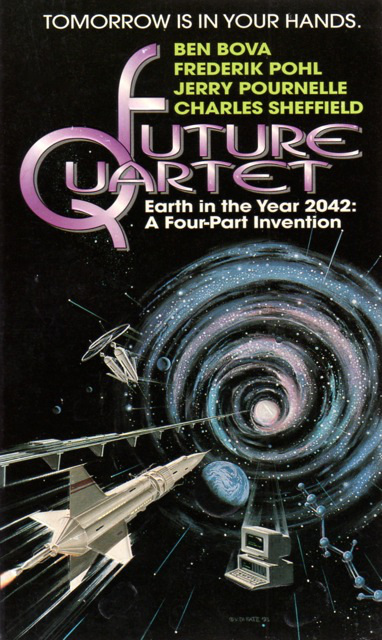The Jerry Pournelle series continues with his involvement in a project that included Ben Bova, Frederik Pohl, and Charles Sheffield.
Raw Feed (1995): Future Quartet: Earth in the Year 2042: A Four-Part Invention, eds. Ben Bova, Frederik Pohl, Jerry Pournelle, Charles Sheffield, 1994.
“Introduction”, Charles Sheffield — The origins of the project and its assignment to Ben Bova, Frederik Pohl, Jerry Pournelle, and Charles Sheffield to provide perspectives ranging utopian to dystopian. There is also an interesting list of technologies and sociopolitcal events and problems not considered by futurists of 50 years ago.
“2042: A Cautiously Pessimistic View”, Ben Bova — Bova’s futuristic speculations related in fictional form as an address by Chiblum C. Lee, Chairman of the World Council. Bova postulates a world of climate change from global warming (desertification and famine), cheap energy (fusion and solar power satellites), aquaculture, and deep-sea mining where space is starting to be exploited. However, it is also a world of over ten billion people with a large gap between rich and poor countries. Lee proposes taxing rich countries to better the lot of poor countries. (The old foreign aid scheme which doesn’t work now because poor countries are poor through internal political and social problems and nothing else.) He realizes that the rich countries must see this to be in their self-interest, that coercion will not work and that vested interest will resist change. Nothing real new here. I thought Bova was more conservative and had faith in free markets as the tool to enrichments. This is a scenario of bigger foreign aid.
“The Kingdom Come”, Ben Bova — An alright story narrated in first person and a take-off on Bova’s “2042: A Cautiously Pessimistic View” before it in the anthology. It involves protagonist Salvatore Passalacqua from the grim inner city of Philadelphia and his prostitute girlfriend (an unrequited love). Both don’t legally exist, and both get involved in a plot to take World Chairman Lee hostage. This is a pretty standard sf tale of a poor, violent future urban America with only a few points of interest. First, Passalacqua is a electronics genius. Second, the terrorists kidnapping Lee are not entirely bad. They want the World Council to depose dictators in their own countries, but the World Council refuses to interfere with nations’ internal affairs. Third, the Controllers are accused of all sorts of things throughout the story but seem to be a branch of the Controllers who help certain individuals out of poverty via education. Lastly, Passalacqua rejects a world of interconnectedness, a world where the poor can be helped and things changed. In a plot contrary to the usual poor-person-accidentally-given-the-chance-at-betterment–and-taking-it plot, he rejects his chance at education and returns to die in Philadelphia (it’s presumed). His girlfriend takes her chance, though, and studies law.
“A Visit to Belindia”, Frederik Pohl — As Pohl says, he was given the most pessimistic future forecast, so his particular vision of the future can be partially excused as being dictated by formula. However, much of the vision is Pohl’s personal view especially the world plagued by ozone destruction and global warming. However, I agree with his concerns about aquifer depletion. (Though that problem could be solved, albeit at great expense, with water desalinization technology.) Some of the worries cited are straight out of yesterday’s headlines: the idea that corporate mergers are bad, hurt economic efficiency, and drain R&D money. The argument can be made that corporate raiding improves efficiency and frees up money, federal deficits, and decaying infrastructures. Pohl seems ignorant of the questionable comparisons and statistics used to show this problem. [Older self is less convinced that economic efficiency should be the foremost value sought or that corporate mergers accommodate it.] As Pohl admits, this is a pessimistic, straight-line extrapolation of current trends with no assumption of social/political change and little technological change (except in medicine) and little questioning whether these trends (like global warming) exist to be extrapolated. Still, it’s a witty piece since it’s a story about a man revived from cryonic suspension with a zinger ending where he’s dumped without money (it all went for his medical care) on to the poor streets of Belindia. Belindia, a term originally used for Brazil, is a description of two countries occupying the same space: a Belgium-like country of rich people and an Indian-like country of many more people.
“What Dreams Remain”, Frederik Pohl — A story of bitter wit. Pohl starts his story with a setup that his fellow anthology contributors Ben Bova and Jerry Pournelle might use: a grim future of economic depression, ozone depletion, greenhouse warming, the rich huddled in “Reservations”, resource shortages (not only minerals and food but spare parts), and space travel crippled by low Earth orbit debris. Jake Bailey, story’s protagonist, is recruited by a very rich tycoon who runs a secret underground of space enthusiasts (both those who remember the age of space and young people attracted to the memory of those days). To keep alive this remaining dream of space travel, of L-5 colonies and mining space for minerals, the tycoon Parkinson spends a lot of money and also steals “strategic resources”. In other hands, Bailey would be converted to the cause of space as man’s salvation and the story would end with a successful space launch and the dawn of a better age. Not here. Bailey is a down-on-his luck electrical engineer who knows what people want to hear and says it whether it to get sex or a place in a Reservation. He betrays Parkinson as a resource thief and, with the reward, buys himself a place in the Reservation. It’s not that Pohl is unsympathetic to the benefits of space. He lists weather satellites as a benefit of the vanished space age. However, the story is told from Bailey’s viewpoint, and he sees a generation of older people who destroyed the world and who are not squandering the remaining resources on an impractical dream to restore the space age. (It’s a ruthlessly defended dream too since, after having the space underground revealed to him, Bailey would have been killed if he hadn’t joined.) Plot and theme is similar to C. M. Kornbluth’s “The Luckiest Man in Denv”. And Parkinson does seem to be somewhat impractical. If Bova or Pournelle had written the story, the problem would be overcome by clever engineering. It’s not only a clever commentary on the romantic space travel myth of sf, but also a commentary on how even practical solutions to problems (if Parkinson’s schemes are that) can be sabotaged by political and social perceptions.
“Report on Planet Earth”, Charles Sheffield — A plausibly utopian story with a lot of standard technological solutions to contemporary problems along with help from Earth’s homeostatic climate to buffer against climate change. I thought the most novel notion here was the idea that, under computer directed production, products could be individually tailored on the assembly line.
“The Price of Civilization”, Charles Sheffield — This story reminded me of how very good Sheffield is. The story’s title sounds vaguely like something a British colonial would say, and that’s no accident for this story is about the same kind of patronizing contempt some of the British administrators felt for their native underlings. The civilization of this future society has no war, no starvation, and little violent crime. The price of this civilization is the creation of ELitE (the protagonist Todd Prince/Velden adds that “mandatory birth control and a stable population helped”), a caste that is officially stigmatized, that allegedly can’t read or write, that for some unexplained reason, was necessary to define and discriminate against. The trouble is Todd Prince/Veblen’s young daughter has taken up with an ELitE, one creative, musically talented, and literate boy. Gregg Wescott, who seems to be the brother-in-law of Todd as well as a friend, urges him to squash the affair. Wescott has Todd’s daughter infected as a vector with a deadly sexually transmitted disease which kills her boyfriend. (Wescott even talks in horrified tones about the girls defilement, yet she is expected to be sexually active at her age.) Todd accepts and applauds thereby exhibiting the ruthlessness of his great-grandfather who defrauded his own mother and tried to take his children. For that matter, Todd’s father was one of the authors of the legislation that created ELitEs. The boy’s death is the price of civilization as the non-ELitEs see it. I suspect that the bit with the Neoteens (genetically engineered, mentally superior children) shows up some hypocrisy of the story’s non-ELitEs. They are perfectly willing to deal – indeed, invest in – humans deliberately engineered to be different (and who might, though this is not brought up, supplant them) yet won’t deal with an arbitrarily defined set of sometimes normal humans.
“Democracy in America in the Year 2042”, Jerry Pournelle — One of the reasons I like Pournelle is that his view is of man’s future is much like mine: technological optimism (he convicingly argues we will be able to solve the problems of food, energy, and minerals) with social, political, and moral pessimism. He knows that the real work of engineering a desirable society lies in the irrational realm of human behavior, the spheres of government and religion. Here (in a 1992 essay) he is pessimistic about an America plagued by a Congress of low turnover, violent teenagers, bad education, and vindicative politicians.
“Higher Education”, Jerry Pournelle and Charles Sheffield — A Heinleinesque tale (appropriate given that Pournelle was a friend of Heinlein and modeled his writing on him) about a young man finding his way in the world through the hard, rigorous instruction of adults who (like Johnny Rico’s civics teacher in Heinlein’s Starship Troopers) are not what they appear to be. Here the world is an exaggerated debacle of public schools with sexual harassment laws, readers (machines that read text aloud since few students know how to read), video surveillance, and condom dispensers. A bored, bright, cynical, amoral, ignorant boy must learn to survive as a space worker. There is some indication that there may be a sequel involving a cabal infiltrating the nightmare schools of a future America to reform or destroy them. It’s a good moral tale and political satire but a not particularly plausible story. Why would space corporations bother educating public school students when private students exist? What about Earth’s other countries? Granted it is hinted that other corporations educate the children of their workers to get the necessary skills, and other countries exploit space. This is, after all, an anthology about America in 2042.
More reviews of fantastic fiction are indexed by title and author/editor.
Advertisements Share this:




